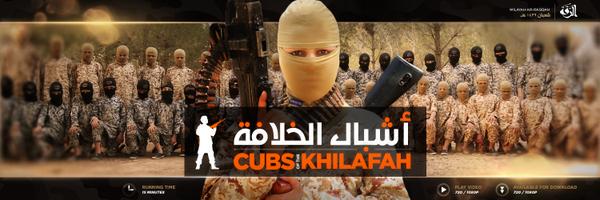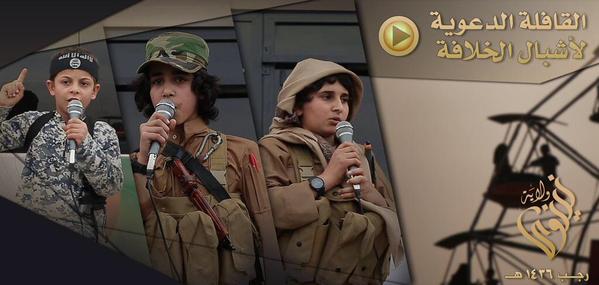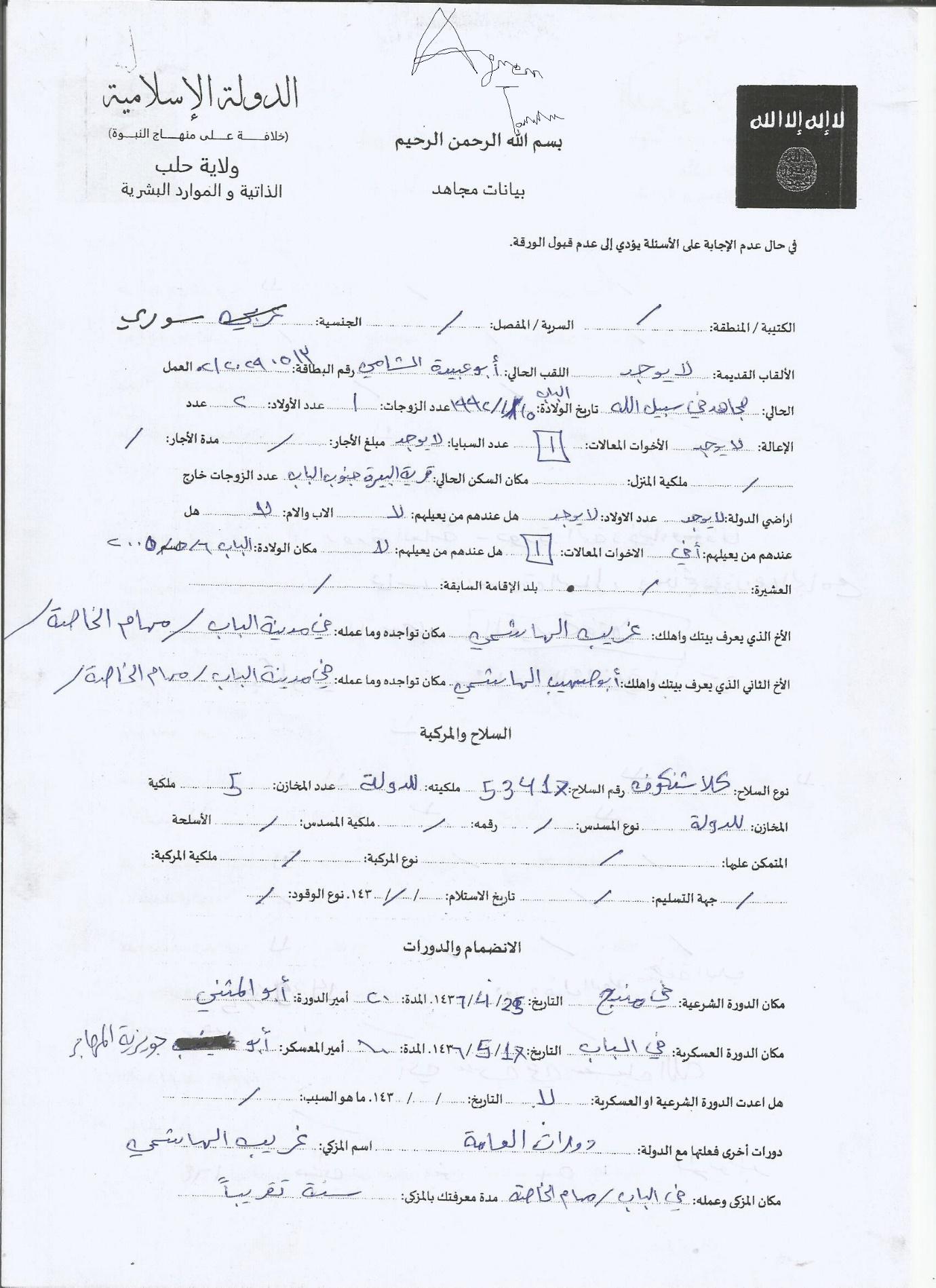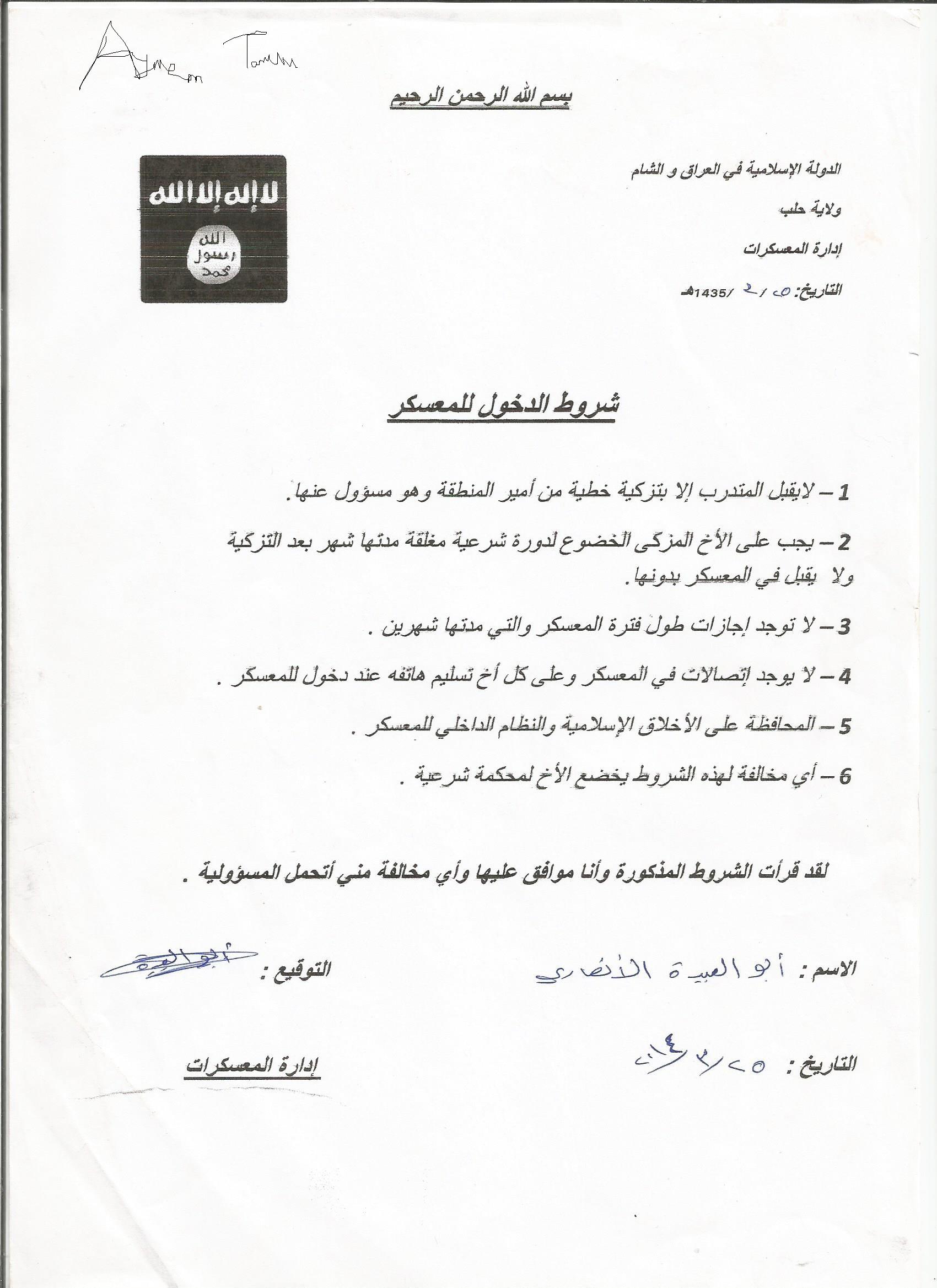
___________________
To inquire about a translation for this video message for a fee email: [email protected]
Search Results for: cubs of the caliphate
New video message from The Islamic State: “Cubs of the Caliphate – Wilāyat Dijlah

_______________
Source: https://archive.org/details/ashb3l_alkhilafa
To inquire about a translation for this video message for a fee email: [email protected]
New video message from The Islamic State: "Cubs of the Caliphate – Wilāyat al-Raqqah"

______________
To inquire about a translation for this video message for a fee email: [email protected]
New video message from The Islamic State: "Cubs of the Caliphate Brought Up In Their Environs – Wilāyat al-Khayr"

_______________
To inquire about a translation for this video message for a fee email: [email protected]
New video message from The Islamic State: "Da'wah Convoy for the Cubs of the Caliphate – Wilāyat Nīnawā"

______________
To inquire about a translation for this video message for a fee email: [email protected]
Articles of the Week – 7/14-7/20
The al-Shabab Finance System – Hiraal Institute: https://bit.ly/2mjIwjL
A New Era of Insurgent Recruitment: Have ‘New’ Civil Wars changed the Dynamic? – William Reno and Jahara Matisek, Civil Wars: https://bit.ly/2JE0W82
What Happens When Your Town Becomes an ISIS Recruiting Ground? Lessons from Central Asia about Vulnerability, Resistance, and the Danger of Ignoring Perceived Injustice – Noah Tucker, Central Asia Program: https://bit.ly/2O2DiFH
Too dangerous for fieldwork? The challenge of institutional risk-management in primary research on conflict, violence and ‘Terrorism’ – Jeffrey Alan Sluka, Contemporary Social Science: https://bit.ly/2mYhY7Z
Tuesday July 17:
The banality of counterterrorism “after, after 9/11”? Perspectives on the Prevent duty from the UK health care sector – Charlotte Heath-Kelly and Erzsébet Strausz, Critical Studies on Terrorism: https://bit.ly/2LvMFw4
From Jabhat al-Nusra to Hay’at Tahrir al-Sham: Evolution, Approach and Future – Aymen Jawad al-Tamimi, KAS: https://bit.ly/2uEeKe0
Wednesday July 18:
Lone Actor Terrorists: A Residence-to-Crime Approach – Zoe Marchment, Noémie Bouhana, and Paul Gill, Terrorism and Political Violence: https://bit.ly/2uBsTc4
Thursday July 19:
Press coverage of lone-actor terrorism in the UK and Denmark: shaping the reactions of the public, affected communities and copycat attackers – David Parker, Julia M. Pearce, Lasse Lindekilde, and M. Brooke Rogers, Critical Studies on Terrorism: https://bit.ly/2zXiigI
Politics and Threat Perception: Explaining Pakistani Military Strategy on the North West Frontier – Paul Staniland, Asfandyar Mir & Sameer Lalwani, Security Studies: https://bit.ly/2LT4Xuq
Rearing Cubs of the Caliphate: An Examination of Child Soldier Recruitment by Da’esh – James Morris & Tristan Dunning, Terrorism and Political Violence: https://bit.ly/2Maeevj
Exploring the Radicalization Process in Young Women – Clara Isabel Morgades-Bamba, Patrick Raynal & Henri Chabrol, Terrorism and Political Violence: https://bit.ly/2voXidf
Friday July 20:
Burying the Lede: The Islamic State Downsizes? – Brian Dodwell, Daniel Milton, and Muhammad al-‘Ubaydi, Combating Terrorism Center: https://bit.ly/2M5ptEW
New release from al-Muhājirah al-Gharbīyah: “Important Advice For the Female Captives From the Free Women of This Nation”
الحمدُ لله وكفَى، والصَّلاةُ والسّلامُ على النبيِّ المُصطَفَى، وعلى آلِهِ وصحبِه ومن لأثرِهم اقتَفى،
أمّا بعدُ؛
فمِمّا لا يخفَى علَى أُمّتِنا الثّكلَى ما حلَّ بإمائِها الحرائِر منْ عظيمِ بلاءٍ، تتفطّرُ له قلوبُ الغيَارَى ولا نقولُ سوى اللهم إنا نعوذ بكَ من جَهدِ البلاء، ودركِ الشقا، وسوءِ القضاء، وشماتةِ الأعداءِ.
ومن المعلومِ أن ما حلّ بنساءِ أمتنا في مخيّمات الذلّ، لهو من النوازلِ التي يحارُ فيها اللبيب، فأن تؤسرُ عوائلُ بأكملها جلها من النساء والأطفال وبهذه الأعداد المهولة، من الحادثات التي قل أن شهدها تاريخُ البشريّة؛ {وَمَا نَقَمُوا مِنْهُمْ إِلَّا أَن يُؤْمِنُوا بِاللَّهِ الْعَزِيزِ الْحَمِيدِ}.
وقد بلغتنا بعضُ التصرّفاتِ التي صدرت وتصدرُ من بعضِ أخواتِنا الأسيرات – أصلحهنّ الله – والتي تفتقد إلى الكثيرِ من الحكمةِ والسّياسةِ، وهي تصرّفات وأفعال وإن كانت فرديّة إلّا أنها تعود غالبًا بالضررِ على جميعِ الأسيرات، كما ولا ننكرُ أن بعضَ تلك التصرّفات ناجمة عن حرقةِ الأختِ على دينها وسعيها للذبّ عن عقيدتها، فرأينا أن نستعينَ بالله تعالى ونكتبُ هذه الكليمات، نُصحًا للأخواتِ وإرشادًا للأسيرات والله من وراءِ القصد.
?أوّلًا؛ فلتعلم الأخت الموحّدة المسلمة أنّ الطريقَ إلى اللهِ طريقٌ شائكٌ مليءٌ بالعثراتِ والعقبات، وأنّ الابتلاءَ في ذات الله عزّ وجلّ ليس حكرًا على الرجلِ دون المرأةِ، فالمرأةُ أيضا تُبتلى فتُقتلُ وتؤسرُ؛ وقد تُسبَى وتُبترُ، وما إلى ذلك من المكارهِ التي يُكابدها المسلمُ الموحّد في سبيل ربه وإعلاءً لكلمتِه في الأرضِ.
ففي سبيل الحنيفيّة أسِرت سارة زوج خليل الله إبراهيم عليه السّلام، وراودها طاغوت مصر على نفسها ونجّاها الله منه، وفي سبيل الحنيفيّة عُذبت آسيا زوج فرعون، وفي سبيل الحنيفيّة قُتلت سميّة بنت خيّاط، وفي سبيل الحنيفيّة جاعت خديجة أم المؤمنين وبناتها بنات النبيّ – صلّى الله عليه وسلم – حتى كان أهل مكّة يسمعون أصوات النساء والأطفال المحاصرين في شعب أبي طالب وهم يتضوّرون جوعا!
فلا تظنّي أختي الأسيرة – ثبّتكِ الله – أن ما قد أصابكِ أمرٌ جديدٌ مُحدث، بل هو طريق الأولين ومن تبعهم بإحسانٍ إلى يوم الدّين؛ “وكذلك الرسل تبتلى ثم تكون لها العاقبة”.
?ثانيًا؛ اعلمي – سلّمكِ الله – أنّكِ وأنتِ أسيرة مُستضعفةٌ، والاستضعافُ من الضّعفِ، والضّعف خلافُ القوّةِ.
ومن لطفِ الله بعبيده أن جعل من شريعته شريعةً سمحةً فيها مراعاةٌ لأحوالِ العبادِ عند الاضطرارِ والضّرورةِ، بل قد تتغيّرُ الأحكامُ بناءً على وضعِ العبدِ أو الجماعةِ.
قالَ اللهُ تعالى: {فَمَنِ اضْطُرَّ غَيْرَ بَاغٍ وَلَا عَادٍ فَلَا إِثْمَ عَلَيْهِ إِنَّ اللَّهَ غَفُورٌ رَحِيمٌ} [البقرة:173].
وقال أيضًا:{فَمَنِ اضْطُرَّ فِي مَخْمَصَةٍ غَيْرَ مُتَجَانِفٍ لِإِثْمٍ فَإِنَّ اللَّهَ غَفُورٌ رَحِيمٌ}[المائدة:3].
ومن السُنّةِ النبويّةِ المُطهرةِ فلنَا في قصّةِ عمّارِ بنِ ياسر – رضي الله عنه – عبرٌ وفوائدُ، إذ لاقَى عمّار في سبيلِ الله ما لاقى من مُشركي قريش وأكرهوه على قولِ كلمةِ الكفرِ، فنزلَ قولُ الله تعالى:
{إِنَّمَا يَفْتَرِي الْكَذِبَ الَّذِينَ لَا يُؤْمِنُونَ بِآيَاتِ اللَّهِ ۖ وَأُولَٰئِكَ هُمُ الْكَاذِبُونَ مَن كَفَرَ بِاللَّهِ مِن بَعْدِ إِيمَانِهِ إِلَّا مَنْ أُكْرِهَ وَقَلْبُهُ مُطْمَئِنٌّ بِالْإِيمَانِ وَلَٰكِن مَّن شَرَحَ بِالْكُفْرِ صَدْرًا فَعَلَيْهِمْ غَضَبٌ مِّنَ اللَّهِ وَلَهُمْ عَذَابٌ عَظِيمٌ} [النحل: 105 106].
قال ابنُ عباس – رضي الله عنهما – : (أخذه المشركون وأخذوا أباه وأمه سميَّة وصهيبًا وبلالًا وخبَّابًا وسالمًا فعذبوهم، وربطت سمية بين بعيرين ووُجِئ قُبُلها بحربة، وقيل لها إنك أسلمت من أجل الرجال، فقُتلت وقُتل زوجُها ياسر، وهما أول قتيلين في الاسلام.
وأما عمار فأعطاهم ما أرادوا بلسانه مكرهًا، فشكا ذلك إلى رسولِ الله صلى الله عليه وآله وسلم، فقال له رسول الله صلى الله عليه وآله وسلم: (كيف تجد قلبك؟) قال: مطمئن بالايمان، فقال رسول الله صلى الله عليه وآله وسلم: (فإن عادوا فعد) [رواه الحاكمُ وقال على شرط الشيخين].
وعن ابنِ عبّاسٍ – رضي الله عنهما – يرفعه قال: قال – صلى الله عليه وسلم – : (إنَّ الله وضع عن أمتي الخطأ والنسيان وما استكرهوا عليه) [رواه ابن ماجه وابن حبان يرفعه وكذا الحاكم وقال صحيح على شرط الشيخين].
وبناءً على ما تقدّم يتبيّنُ للأختِ الأسيرةِ أنّها مُستضعفة وتأخذُ حكمَ المضطرِّ في أمورٍ كثيرة، والضرورةُ تُقدّرُ بقدرها، ومن المؤكّد أن من تُعذَّب في السجونِ ويُنتهكُ عرضها ويذيقُها أعداءُ اللهِ صنوفًا شتّى من صنوفِ التعذيبِ والتّنكيلِ، ليست كمن تجلِسُ في خيمةٍ لا تُعذّبُ ولا تُستكرهُ على شيْءٍ وإنّما هي مسلوبةُ الحريّة لا أكثر!
?ثالثًا؛ وإذا ما استوعبتِ أختنا أنّكِ مُستضعفة، ينبغي لكِ حينها أن تعلمي أنّ أهل العلمِ قد قرّروا قاعدةً فِقهيّةً عظيمةً ألا وهيَ: “درء المفَاسِدِ مقدّمٌ على جلبِ المَصالحِ”
ومعناهَا؛ أنّه إذا تعارَضَت مفسدةٌ ومصلحةٌ يُقدَّم رفعُ المفسدةِ على جلبِ المصلحةِ؛ لأنّ اهتِمامَ الشّرعِ بالمنهيَّات أشدُّ من اهتمامِه بالمأموراتِ، وخيرُ مثالٍ على تجلّي هذه القاعدة في أيّامِنا هذه ما يحدثُ بينَ أخواتِنا الأسيرات، فتأتي إحداهنّ أو بعضهنّ بفعلٍ ظاهره المصلحة ولكن عواقبَه تكون وخيمةً على بقيّة الأسيرات واللهُ المُستعان.
بعضُ الأخواتِ – هداهنّ الله – ينادين بالجهادِ وهنّ في الأسر! أيّ جهادٍ هذا يا رعاكِ الله؟! وليست رسالة إحدى الأخوات عنّا ببعيد والتي خاطبت فيها جُنودَ الدولةِ واستنفرتهم بما معناه: (نحن جاهزات وقد حددنا السكاكين وقد اشتقنا لأصوات الرصاص والانفجارات)، والله ما هذا إلا قلّة عقلٍ، إذ كيف لعاقلةٍ أن تتفوّه بمثل هذه الأمور التي قد يتّخذها السجّان حُجّةً للنّيل من الأسيراتِ وتنغيصِ عيشهنّ المنغّصِ أصلًا؟!
وتستغلها الصحافة للتحريض على الأسيرات؛ مما يُطلق السجانين بالتنكيل بالأسيرات دون رقيب أو عنيب.
حسنًا؛ ماذا جنيتنّ من الاعتداء على العساكر أوقتلِ عنصر أو اثنين منهم؟
لا شيء سوى مزيدًا من التضييق على المهاجراتِ ومنعهنّ من السوق والتداوي وجميع مؤهلات الحياة، حتّى الماء والثلج الذي كان يدخل إليهم منعوه عنهن في أشدّ الأيّام حرًّا!
وهذا غير تجديد التحقيق والتفتيش والإهانة والإذلال.
وهذا ما لا تُقدّره الكثير من أخواتِنا – أصلحهنّ الله – اللاتي لازلن يعشنَ على أنغام الخلافةِ والتّمكين!!
لا
The Archivist: Unseen Islamic State Training Camp Contract
—
Unseen Islamic State Training Camp Contract
By Aymenn al-Tamimi
The management of training camps for the Islamic State (IS) falls under an administrative body called Idarat al-Mu’askarat (“Camps Administration”). This body will naturally be linked to the Diwan al-Jund (“Department of Soldiers”), one of a series of diwans drawn up and established for the declaration of the Caliphate.
Some details of the functioning of the training camps exist in testimony outside of internal documentary evidence. For example, Omar Fawaz, a pro-IS activist based in Mosul who abandoned media work, distinguished in postings he put in 2015 between training camp courses for the muhajireen (i.e. foreign fighters), which according to him can last 90 days or more, and training camp courses for the ansar (ï.e. local Syrians and Iraqis) that last 30-50 days. He also noted distinctions as regards the ages of recruits: those between the ages of 5 and 15 are classed as ashbal (“cubs”) while those aged 15 and above are classed as adults.
Training camp routines in their current form appear to consist of combinations of sessions of physical training, combat training and Shari’i study. Some of the internal textbooks used to teach training camp recruits about Islam have come to public light, most notably the Muqarrar fi al-Tawheed (“Course in Tawheed”), which I have translated in full here. These books are issued by the Diwan al-‘Iftaa wa al-Buhuth (a diwan that issues fatwas and investigates religious matters, publishing studies and pamphlets).
The document that is the focus of this piece and was obtained amid the current Turkish-backed Euphrates Shield rebel push on the IS stronghold of al-Bab in north Aleppo countryside helps shed some further light on the functioning of the training camps. Note that the document- a contract for agreement to enter a training camp- dates from the time before the declaration of the Caliphate, and thus has the label of the Islamic State in Iraq and al-Sham. The document is also useful in this context in illustrating the existence of the Idarat al-Mu’askarat prior to the establishment of the Caliphate, illustrating that the foundations of present IS administration as we know it did not spring out of nowhere, but rather the groundwork was laid in significant part by real control of territory in Syria over the course of 2013 and the first half of 2014.
Of more specific note are some of the terms of the contract. For example, a recruit must have a written tazkiya (vouching for someone) from the amir of the area in order to enter the training camp. It is important to point out here that tazkiya exists on multiple levels within IS. The concept is foremost associated with the initial recruitment of someone into the ranks of IS. In the fighter files that were leaked last year to multiple media outlets, the files notably take the form of questionnaires under the title of Bayanat Mujahid (“Statements [/Data] of a Mujahid”). These files- which date in considerable part from the pre-Caliphate era and came under a bureaucratic department known as the “General Administration for the Borders” (the predecessor body to the Hijra Committee that partly deals with new arrivals to IS territory)-include the question of whether someone has tazkiya. In contrast, the tazkiya that we see in this training camp contract can be thought of as an example of what we might call internal tazkiya. On the basis of other internal documents (namely, Abu al-Faruq al-Masri’s dissenting work al-Manhaj al-Sayasi wa al-Tandhimi lil-Dawlat al-Islamiya), this concept also exists in other areas of IS administration such as the Hisba and Zakat departments, where recruiting new personnel should involve tazkiya from persons who have competencies in the same fields of expertise/vocation as these recruits.
Another term of interest is the requirement for the recruit after tazkiya to undergo a Shari’i course for a month before being accepted into the camp. This does not necessarily mean that there is no Shari’i study in the camp itself. However, it is notable from later specimens I have of Bayanat Mujahid forms that a distinction is made between a Dawra Shari’ia (“Shari’i course”) and a Dawra ‘Askariya (“military course”). These documents clearly follow the Caliphate declaration and come under the label of personnel data and human resources. Observe a sample document below (Figure 1)- also obtained amid the offensive on al-Bab- featuring part of a Bayanat Mujahid form from Aleppo province (Wilayat Halab) for one Abu Obeida al-Shami. In the section entitled “joining and courses,” we see he had a Shari’i course in Manbij lasting 20 days, and a military course in al-Bab for 10 days. The former has an entry for the amir of the Shari’i course, while the latter has an entry for the amir of the camp.

Figure 1: Part of the Bayanat Mujahid form for Abu Obeida al-Shami
In total, the Dawra Shari’ia and Dawra ‘Askariya entries in these forms I have from the al-Bab area mostly seem to add up to around 30 days or slightly more. Perhaps when Omar Fawaz wrote of the training camp course times for local fighters, he was adding these entries together. From the contract, the total time of the Shari’i course and time in the camp add up to 3 months (a month of the Shari’i course and 2 months in the camp), which equates to training camp times for the muhajireen as per Omar Fawaz’s testimony. In this case though the signatory is a local fighter, as borne out in his Ansari kunya. Could it be that the contract reflects an earlier set of circumstances in which there was a greater influx of muhajireen? Are the contract conditions localized for Aleppo province? A degree of speculation comes in here on account of insufficient quantities of documentary evidence.
Finally, note the reference to ijazat in the contract, with the stipulation that ijazat are not to be granted during the time one is in the camp. Ijazat are leave permits granted to personnel for a variety of reasons (e.g. to see one’s family) and they are among the most common IS documents that turn up when left behind by retreating IS forces. For samples of these leave permits, see my raw archives of IS documents.
Below is the training camp contract, with full translation and explanatory notes in square brackets.

Figure 2: Training camp contract
In the name of God, the Compassionate, the Merciful
Islamic State in Iraq and al-Sham
Wilayat Halab [Aleppo province]
Idarat al-Mu’askarat
Date: 25 Rabi’ al-Awal 1435 AH [appears to be an error: confusion with handwritten CE date at end of contract]
Conditions to enter the camp
1. The trainee is only to be accepted with written tazkiya from the amir of the area and he is responsible for it.
2. The brother given tazkiya must be subjected to an indoor Shari’i course for a month after tazkiya. He cannot be accepted in the camp without it.
3. There are no ijazat during the time one is in the camp, whose period is 2 months.
4. There are no connections in the camp and every brother must hand over his phone on entering the camp.
5. Observe Islamic ethics and the internal system for the camp.
6. Any violation of these conditions will mean the brother is subjected to a Shari’i court.
I have read the above conditions and agree to them. I bear responsibility for any violation on my part.
Name: Abu al-Obeida al-Ansari
Signature: Abu al-Obeida
Date: 25 March 2014 CE
Idarat al-Mu’askarat
New statement from the Global Islamic Media Front: "Congratulations to the Islamic Ummah for the Blessed ‘Īd al-Fiṭr, 1435 H"

=&0=&
__________
